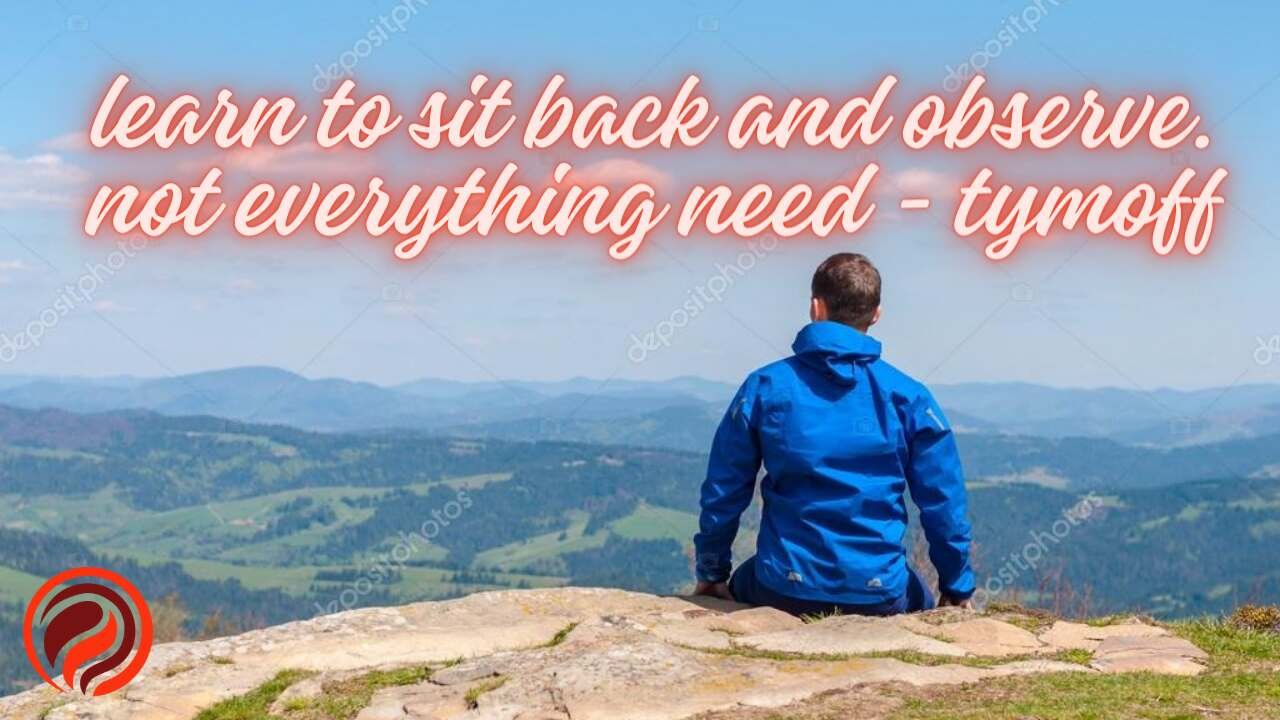In an era where the pace of life seems to accelerate with each passing day, the adage “Learn to Sit Back and Observe. Not Everything Need – Tymoff” offers a refreshing counter-narrative to the relentless hustle culture. This principle encourages us to embrace the power of observation and reflection, serving as a guiding light in navigating the complexities of our modern existence.
The Concept of Observing Before Acting
At its core, the notion of sitting back to observe before acting is a call to mindfulness. It beckons us to break free from the cycle of knee-jerk reactions and to approach life’s unfolding dramas with a sense of composure and deliberation. By adopting a stance of observation, we grant ourselves the opportunity to process events and circumstances more thoroughly, leading to decisions that are informed, thoughtful, and less prone to the regret that often follows hasty actions.
Deciphering ‘Tymoff’
The term ‘tymoff’ injects an element of intrigue into this phrase. While not a term found in standard dictionaries, it can be interpreted as an amalgam of ‘time off.’ In this context, ‘tymoff’ symbolizes the essential pause, a hiatus from immediate responses that allow for a more considered and potentially insightful reaction. It underscores the value of time in our decision-making processes, suggesting that a momentary step back can significantly impact our clarity and judgment.
Real-Life Applications
The application of this principle extends across the spectrum of daily experiences. In professional settings, it might mean refraining from instant replies to complex emails, allowing for a more nuanced response after reflection. In personal relationships, it could involve listening actively and observing before responding to a partner’s concerns, fostering more profound understanding and empathy. Even in the realm of social media, taking a moment to reflect before commenting or reacting can prevent misunderstandings and promote more meaningful interactions.
Benefits of Embracing the Pause
The benefits of this practice are manifold. Psychologically, it aligns with the principles of stress management and emotional regulation, offering a buffer against the impulsivity that can lead to anxiety and regret. Socially, it enhances our interactions with others, providing a space for empathy and understanding to grow. Moreover, from a decision-making perspective, it endows us with the ability to respond to situations with a balanced and measured approach rather than being swayed by the heat of the moment.
Do Read: ‘I Fear No One, But Respect Everyone. – Tymoff’s Guiding Principle
Challenges and Overcoming Them
Embracing this contemplative approach does not come without its challenges, especially in a culture that often equates speed with efficiency. The urge to respond immediately can be strong, driven by internal pressures or external expectations. Overcoming this requires conscious effort and practice. It might involve setting personal rules, such as waiting a set amount of time before responding to messages or making decisions, or employing mindfulness techniques to cultivate a state of presence and awareness.
Incorporating the Practice into Daily Life
To integrate this philosophy into daily life, one can start by identifying moments when the impulse to react is strongest and consciously choosing to pause. This could be as simple as taking a deep breath before responding to a question or allowing a day to pass before making a significant decision. Over time, these practices can evolve into a habit, gradually transforming how we interact with the world around us.
Conclusion
“Learn to Sit Back and Observe. Not Everything Need – Tymoff” is more than just a piece of advice; it’s a perspective on life that champions the virtues of patience, reflection, and thoughtful engagement. In a world that often values the quick over the quality, it reminds us that there is wisdom in stillness and observation. As we navigate the complexities of our lives, let us remember the power of taking a moment to pause, for it is in these pauses that we often find our most significant insights and make our most meaningful choices.












